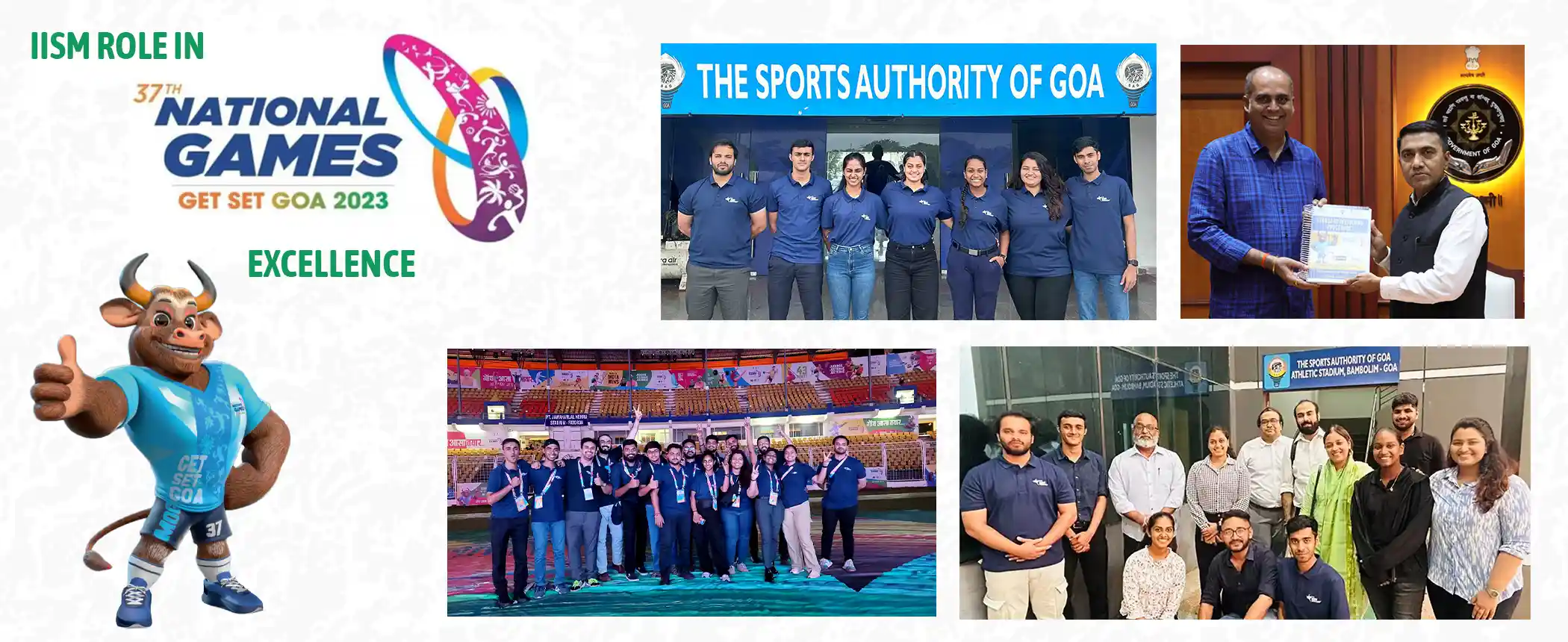7 Key Skills You Must Learn to Become a Sports Manager

What is that one thing that Usain Bolt can’t beat right now? India’s fastest-growing Sports Industry.
The sports industry in India is expected to rise to a $130B market by 2030, according to a recent Google & Deloitte Report, creating numerous job opportunities. And talking about opportunities, a huge career potential awaits aspiring sports managers in India.
Becoming a sports manager is the career of the decade. Well, can you deny the extravaganza of IPL — from a startup league to one of the world’s biggest sports events. Likewise, the success of WPL, PKL and several other sporting leagues is on the rise. Besides the popular sports like cricket and football, grassroots sports are also emerging via the evolution of ‘National Games’ and ‘Khelo India’. Not to mention here, the expansion of Fantasy Sports is also creating an industry of its own.
And that leads to the demand for skilled, knowledgeable, and well-trained sports professionals.
So, how can you enter the Indian sports industry and become one?
If you have a passion for sports and a determination to make your dream come true, the sports industry will embrace you. However, you need a few non-negotiable skills to excel in the industry.
But before that, let’s learn what Sports Management is and how you can pursue the program.
Sports Management involves the business side of sports. In simple terms, it is about planning, organizing, and taking care of everything that helps teams, athletes, and events succeed and promotes sports products and services.
It includes running or managing sports leagues like IPL, international events of the ICC, FIFA, and Olympics, handling sponsorships for a team or an athlete, collaborating between athletes and brands, endorsing brands through sports, and promoting sports products, services, or institutes (Nike, Cult.fit).
The professionals who take care of the individual tasks or the overall responsibility of any team, athlete, event, and sports brand or services, are known as Sports Managers.
Now that you’re clued in, let’s dive deep into how you can become one and what are the non-negotiable skills and the pre-requisite knowledge and experience you should have to excel in the business world of sports.
Education/Training in Sports Management
The secret to joy in any profession is to work in a field you are passionate about. And the same goes for the sports industry.
However, only loving your job won’t help you grow for long. To understand the sports business and gain insights into each vertical with hands-on experience, a degree in Sports Management will help you become a certified Sports Professional. Not only that, whether you want to work for a sports event, take care of the administration in leagues, manage the star players, or deal with sports brands, knowledge, support & training from a premier sports education institute will help you keep ahead of the rest.
Eligibility:
If you wish to pursue Sports Management after completing class 12, consider enrolling in a Bachelor of Sports Management (BSM) program at IISM.
If you want to study advanced sports business, IISM also offers a Master of Sports Management (MSM), regardless of your field of education in your graduation.
Besides, you can go for a Postgraduate Program in Sports Management (PGP) as well, and build an exceptional career in the sports business world.
Click here to explore all the Sports Management programs offered at IISM.
Now, let’s break down the skills and knowledge required to become a Sports Manager:
7 Key Skills of a Sports Manager
1. Sports Knowledge
You don’t have to be an athlete to work as a Sports Manager.
However, having a thorough understanding of a few sports and the rules, top leagues and tournaments, players, current sports news, and a curious mind about how everything works in the sports ecosystem are essential to succeed as a sports business professional.
It is equally important to have a strong understanding of marketing, finance, law, strategy, and operations, and to know how to apply this knowledge in the field of sports.
2. Marketing Knowledge
You can’t be a good sports manager until you know the hack of being a good marketer.
Have you noticed the logos of brands on athletes’ jerseys during matches? This is a marketing tactic where brands promote their products or services. Through sports marketing, many brands also promote athletes, teams, and events, which also indirectly gives them visibility of a larger audience.
Along with traditional marketing, sports are marketed on digital platforms through social media channels, influencer collaboration, etc.

7 Key Skills You Must Learn to Become a Sports Manager
3. Organizational Skills
When you are in the right place at the right time with the right task, you win as a Sports Manager. Your sports knowledge and marketing skills will only work when you channel them through an organized system.
Whether you’re coordinating a team’s trip, planning a tournament, or launching a campaign — being organized is non-negotiable.
You’ll often be managing tight timelines, large teams, high-stress events, sponsorships, and brand dealings. So, judging situations, leading the team confidently, and responding in a crisis are the keys to conducting your responsibility successfully.
For more clarity on this, watch the podcast linked below: “How to Become a Sports Agent ft. Bhavesh Singh”, — the Athlete Manager of the former captain of the Indian Cricket team, Mr. Sourav Ganguly.
4. Problem-Solving Skills
What will you do if an athlete drops out at the last moment?
What will be your strategy if more than one brand of similar product approaches your athlete?
or,
What will be your call at the last minute if you don’t get permission at a venue for a tournament?
Sports managers face these kinds of problems all the time. But, with hands-on training and experience working with the management team, you will learn to navigate the problem easily.
Students at IISM receive many such real-time experiences at work exposures and internships during their Sports Management program, be it in the IPL, National Games, Khelo India, or the Tata Mumbai Marathon. Their experiences at sports events and organizations help them learn how to tackle challenges in the face of uncertainty and obstacles, making them industry-ready sports professionals.
5. Leadership Skills
Do you remember the movie, Jerry Maguire? And do you recall how the sports agent bounced back as an independent athlete manager with only one athlete client? Well, that kind of spirit, motivation, and determination are required to excel in the sports business.
As a sports manager, you’ll be guiding teams, motivating players, and making big decisions.
Strong leadership helps you gain confidence, resolve conflicts, and bring visions to life — whether you’re running a local marathon or managing a multi-million-dollar league.
6. Networking
Networking is net worth, even though this statement is repetitive, it‘s a universal truth.
You must be out there. If a sponsorship deal demands knocking on the doors 100 times, you’d better be ready to do that too. Like every industry, the sports industry runs on connections.
Building professional connections with athletes, media, sponsors, event organizers, and brands is crucial to growing your career. Attend industry events, join sports forums, and reach out to the people who can help you achieve your goals. Use social media, especially LinkedIn, to showcase your thoughts and your area of expertise and build your credibility as a sports manager. These are the opportunities where you actually create value with your knowledge and insights.
To delve deeper into this topic, read our blog about Networking in the sports industry.
How to Build a Network in the Sports Industry?
7. Negotiation Skills
One of the most crucial skills for a sports manager.
It’s the right blend of what you want, and what you need to walk away with. Besides having good communication and interpersonal skills, you should be updated with the market trends, market research, and sports news and polish your negotiation strategy accordingly.
If you are dealing with brands for your athlete or want the sponsor for a marathon, being able to negotiate effectively ensures you get the best outcome for everyone involved.
However, just developing these skillsets won’t be enough. Your skills will be of no value if you don’t apply them at the right place. This is where another vital pre-requisite comes into play for aspiring sports managers.
Hands-on Experience through Work Exposure and Internships
There’s no substitute for real-world experience.
To become a successful sports manager, you need to start experiencing the work in every facet of the sports industry, like Strategic Marketing, Sports Broadcasting, Sports PR and Journalism, Sports Administration, Content Creation, and more.
At IISM, along with theoretical knowledge, you will experience on-field training. Through volunteering at many leagues and sports events, you will gain a deeper understanding of how sports events run. Not only that, work exposure and internships throughout the year will help you handle real-time problems as well.
Every such opportunity of experiential learning allows you to build your portfolio and helps you identify which field in sports management is best for your growth, thereby solidifying your credibility in the industry.
Conclusion
Today, India’s increased prioritisation of sports is reflected everywhere. With the increasing sports budget, government policies aimed at developing grassroots sports, major sports events taking place in India, and a growing fanbase, businesses and brands have a significant opportunity to capitalise on the expanding sports market. Hence, the demand for skilled manpower is continuing to multiply.
So, if you think you can be the right fit in the sports economy, now’s the best time to train yourself to build a phenomenal future as a Sports Manager.
If you are interested to pursue your career in Sports Management, Apply for IISM’s Entrance Exam here: https://admissions.iismworld.com/smat-application-form
If you are interested to pursue your career in Sports Science, Apply for IISM’s Entrance Exam here: https://admissions.iismworld.com/ssat-application-form
Read Next: Sports Education Programmes after Graduation













